
Research Programme on AI & Work
This programme supports research in the sphere of AI & Work.
Dr Felix M. Simon is a communication researcher and Research Fellow in AI and Digital News at the Reuters Institute for the Study of Journalism, a Research Associate at the OII and a former doctoral student at the Oxford Internet Institute. He was a Knight News Innovation Fellow at Columbia University’s Tow Center for Digital Journalism (2021-2024) with which he remains affiliated and is an affiliate at the Center for Information, Technology, and Public Life (CITAP) at the University of North Carolina at Chapel Hill. As a former journalist, he regularly writes and comments on technology, media, and politics for various international outlets.
As a member of the Leverhulme Doctoral Centre “Publication beyond Print” and as a OII Dieter Schwarz Fellow he has been researching the implications of AI in journalism and the news industry since 2019, jointly supervised by Prof Ralph Schroeder and Prof Ekaterina Hertog and formerly supervised by Prof Gina Neff. His doctoral project was generously funded by the Leverhulme Trust and two OII-Dieter Schwarz Foundation Fellowship awards and he has won additional competitive grants from the Minderoo-Oxford Challenge Fund, the Tow Center at Columbia University, Balliol College, among others, for this research on AI, news, and information.
More specifically, his research seeks to understand the structural implications of artificial intelligence, including forms of generative AI such as ChatGPT and DALL:E, for news organisations’ gatekeeping processes—the production and distribution of news—and the public arena.
Studying these questions will not only enhance our understanding of how news organisations and journalists think about, adapt to and deal with a technology that, at first glance, seems to be all about de-emphasising their role in the news; it will also inform our theories of what a future of the news and information environment could look like as the industry is battling uncertainty on several fronts. Ultimately, this project also hopes to provide answers about AI’s effect on journalism’s business models and viability as well as its wider ramifications on the public arena of news, and thus society and democracy.
Felix has published widely, among others, in New Media & Society, Digital Journalism, Journalism Studies, Journalism Practice, The Information Society, International Communication Gazette, Harvard Kennedy School Misinformation Review, International Journal of Press/Politics, the International Handbook of Internet Research and Transformative Works and Cultures and has co-authored various research reports on topics ranging from innovation in the media to COVID-19 misinformation.
He has presented work at various conferences, including ICA and the International Journalism Festival and is an experienced moderator of academic and industry panels. His research and commentary has appeared, among others, in The New York Times, The Guardian, The Washington Post, Politico, Financial Times, Süddeutsche Zeitung, Nature, New Statesman, Business Insider, WIRED, CNN, and the BBC. He has given evidence to inquiries of the UK House of Lords and House of Commons, press regulator IMPRESS, and the United Nations, and frequently advises media organisations on AI.
In May 2023, he was awarded the Hans Bausch Media Prize by German public broadcaster SWR in cooperation with the Institute for Media Studies at the University of Tübingen for his work on AI and news.
His past and current research focus on AI in the news, the political economy of AI and news, political communication and democracy in the digital age, as well as the changing nature of journalism and the media in the 21st century. In addition, he takes an active interest in populism and the future of mis- and disinformation studies. He regularly reviews articles for a range of journals, including for Digital Journalism, New Media & Society, or the International Journal of Communication.
Felix graduated with a BA in Film and Media Studies as well as English Studies (Distinction) from Goethe-University Frankfurt, and he holds an MSc in Social Science of the Internet from the OII. During his previous studies, he was funded by the renowned journalism programme of the German Konrad-Adenauer-Foundation. He is currently a fellow at the Salzburg Global Seminar, an Associate Fellow of the UK Higher Education Academy, and sits on the Advisory Committee of the Center for News, Technology & Innovation. He was a member of the AI and Local News Steering Committee of Partnership on AI
Before returning to the OII for his doctoral studies, Felix worked as a journalist, editor and researcher in London. Past work experience also includes the BBC and Olympic Broadcasting Services (OBS) in London and Innsbruck.
Journalism, News, Artificial Intelligence (AI), Generative AI, Political communication, Media and cultural industries, Populism, Mis- & Disinformation.

This programme supports research in the sphere of AI & Work.
This project seeks to explore the attitudes of platform companies and AI start-ups around AI, news and journalism, particularly how the power relationships between the AI sector and publishers impacts the production and circulation of news.
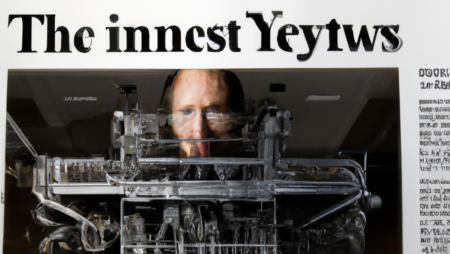
This project studies the adoption, use, and effects of AI in commercial and public service news organisations in the United States, the United Kingdom, and Germany.
My research and doctoral work was supported by the Leverhulme Trust, the OII-Dieter Schwarz Foundation award, Columbia University’s Tow Center for Digital Journalism, the Minderoo-Oxford AI Governance Challenge Fund, and the Balliol Interdisciplinary Institute. In the past I have also worked as a research assistant or researcher on projects supported by the Deutsche Telekom Foundation, European Broadcasting Union, European Journalism Observatory, Google News Initiative, Facebook Journalism Innovation Project, IPPI/Heinrich Böll Foundation, and the Nuffield Foundation.
I have also engaged unpaid consultations with several organisations including the Konrad-Adenauer-Foundation, the UK House of Lords and House of Commons, IMPRESS, the United Nations, TUM School of Management, Goethe-University Frankfurt, the Tow Center at Columbia University, the BBC, the Daily Telegraph, Meta, The Guardian, and the Associated Press.
I sit on the AI and Local News Steering Committee of Partnership on AI, which is funded from philanthropy and corporate entities and for which I received an honorarium. In 2023, I participated in an expert survey run by YouTube for which I received an honorarium. I sit on the Advisory Committee of the Center for News, Technology & Innovation.
I conduct my research in line with the University’s academic integrity code of practice.

With Madhumita Murgia and Dr Felix M. Simon
Through the voices of ordinary people in places far removed from the cosy enclave of Silicon Valley, Code-Dependent explores the impact of a set of powerful, flawed, and often exploitative technologies on individuals, communities & our wider society

With Professor Rasmus Kleis Nielsen and Dr Sarah Ganter
The Power of Platforms with Rasmus Kleis Nielsen & Sarah Ganter

With Marie Le Conte
Escape: How a generation shaped, destroyed and survived the internet with Marie Le Conte

With Dr Deen Freelon and Dr Felix M. Simon
The OII is pleased to welcome Professor Deen Freelon for this webinar, hosted by DPhil candidate Felix M. Simon.
By Felix M. Simon and Luisa Fernanda Isaza-Ibarra
How might AI be used and regulated in the news to the benefit of journalists, news organisations, and the public? This report presents findings and recommendations from the Minderoo ‘AI in the News’ project.
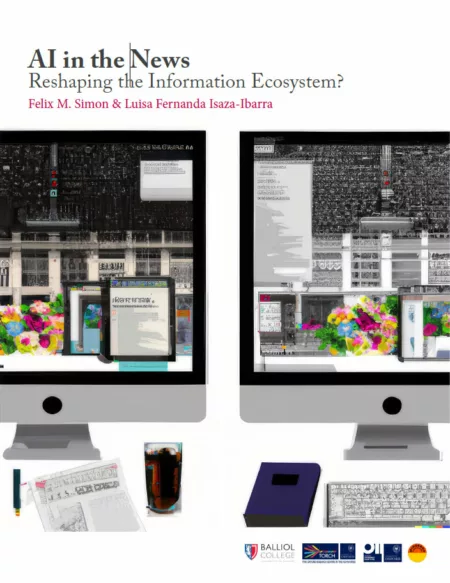
By Amy Ross Arguedas and Felix M. Simon
Generative AI stands to reshape journalism and society. What will these effects be Can we protect democratic values? This report presents findings from the 'Automating Democracy' project and open questions to be addressed as AI unfolds its effects.
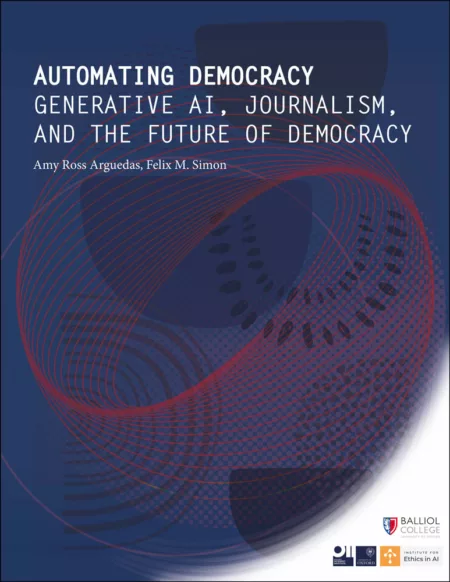

7 February 2024
New research by Oxford Internet Institute DPhil Student Felix M. Simon finds AI is having a significant and increasing impact on journalism.

9 November 2023
Eight OII DPhil students have received Dieter Schwarz Foundation (DSF) funding to enable them to begin a 12-month research project during the course of their studies.

27 October 2023
The OII is leading the debate on Artificial Intelligence. Generative AI has been a key area of interest for faculty, researchers and students for many years. This article brings together some of this work to date and highlights forthcoming work.

18 October 2023
New analysis suggest fears about the impact of generative AI on the misinformation landscape are overblown.

Yahoo!, 17 May 2025
The use of AI chatbots for fact-checking is on the rise. However, Grok's unsolicited claims about "white genocide" show that the responses of Grok, ChatGPT, Meta AI and other chatbots are not always reliable.
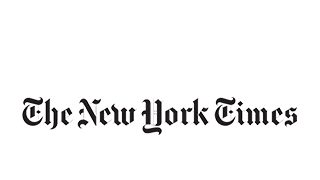
New York Times, 08 May 2025
An avatar of the long-dead British novelist is “teaching” an online writing course. But do we want to learn from a digital prosthetic built by artificial intelligence?

Nikkei Digital Governance, 19 September 2024
2024 has been deal-making time for AI companies and news publishers. At least 26 international publishers have struck licensing deals with AI companies such as OpenAI, Microsoft and Perplexity since the start of the year.

Former Professor of Technology & Society
Professor Neff is the Executive Director of the Minderoo Centre for Technology & Democracy at the University of Cambridge. She is a sociologist who studies innovation, the digital transformation of industries, and how new technologies impact work.
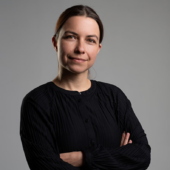
Associate Professor in AI and Society
Ekaterina Hertog is an Associate Professor of AI and Society at Oxford Internet Institute and Institute for Ethics in AI. She studies how the rising digitalisation is reshaping private lives across the world.